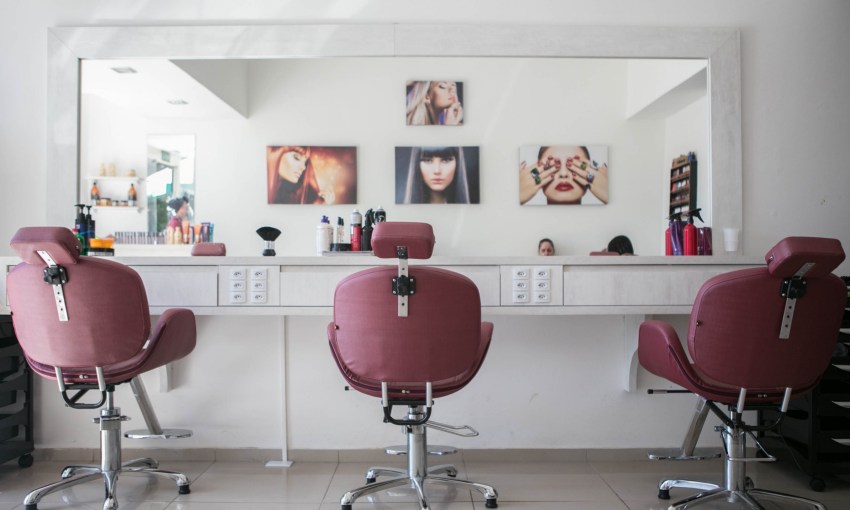A new workshop program held by Working Women's Centre SA will train hairdressers and salon workers to appropriately and safely respond to disclosures of domestic or family violence by their clients.
Salon small talk could save a life
SPECIAL REPORT: COVID-19 ADELAIDE
There’s an intimate relationship that exists between a hairdresser and a client.
In the moments between the official dialogue (‘Just a trim, thanks’), there’s an hour of small talk where each checks in on the glacial evolution of the other’s lives.
Workshop: How to respond to client disclosures of domestic and family violence
Working Women’s Centre SA
Online event
2pm—3pm Monday, 23 November
Register for the free workshop
Keep up to date with future workshops by connecting with Working Women’s Centre SA:
Facebook
Website
Stacey Lee is a former hairdresser. She cut and coloured hair from age 14 to 24, and in that time cultivated meaningful connections with her customers.
Due to the trust built up through these years-long relationships, her clients would reveal stories about mental health issues, gender transitions and abuse from loved ones.
Some of these felt familiar to Stacey, who, at the time, was a victim of domestic violence.
“I still have a lot of post-traumatic stress from it,” Stacey tells CityMag of the past relationship, “but basically my son has special needs and I wanted to make sure that he didn’t have a life like I had.
“I wanted to make sure that I did the best I could to show that he deserved a safe and happy life.”
A 2016 survey by the Australian Bureau of Statistics found one in six women and one in 17 men had experienced partner violence from the age of 15. Since the advent of the pandemic, Women’s Safety Services SA reported a 15 per cent increase in demand for emergency accomodation.
In response to reports like these, the Federal and State governments this year allocated increased money to fund crisis accommodation and reform programs in South Australia. This was to stem an expected surge in numbers due to the coronavirus pandemic.
Stacey eventually left her salon career, wanting to focus on helping people in other ways. While completing a Bachelor of Psychological Science at the University of Adelaide, Stacey began to recognise her relationship as unhealthy. But it took a lot of bravery and education to get to that point.
She’s now on a research journey to help others.
If you’re concerned about your relationship or that of a friend or family member, contact 1800 RESPECT (1800 737 732), DV Crisis Line on 1800 800 098, or contact SAPOL on 131 444, or 000 in an emergency.
“For my honours thesis, I focussed on the disclosures that clients talk to their hairdressers about,” Stacey says.
“Not everyone has access to mental health practitioners or they’re a bit scared of getting help, but people feel comfortable talking to their hairdresser.
“And while it’s great [as a hairdresser] to be able to listen and offer phone numbers and referrals, it’s important not to overstep the boundaries. You don’t get involved in helping them get out of the domestic violence.”
Non-governmental organisation Working Women’s Centre SA (WWC SA) has recognised the role personal care providers, like hairdressers, can play in the response to cases of domestic violence.
The organisation has begun hosting free workshops to educate salon and beauty technicians on how to deal with the disclosure of domestic or family violence by a client.
A focus of the training is how a worker can appropriately take care of their customer, while not jeopardising their own safety.
Cassandra Deon-Wierda is the training officer overseeing the WWC SA program, and tells CityMag she started researching the topic formally in October last year after receiving a $10,000 grant from SafeWork SA’s annual Augusta Zadow Awards.
Since then, she says she’s heard from 60 South Australian hairdressers who have experienced domestic or family violence disclosures from their clients.

Cassandra Deon-Wierda from WWC SA. This picture: Supplied
“I have yet to speak to a hairdresser who has not had a disclosure in their employment,” Cassandra says.
Cassandra relays to CityMag one story in particular she says stuck with her, of a man who stalked his partner while she was getting her hair done. To her the story is and example of where more education in the sector could have helped.
“The [hairdresser] I spoke with at the time wasn’t too sure on how to intervene,” Cassandra says.
“They weren’t sure if they should bring it up or say, ‘Do you know this person? Are you afraid of this person?’
“It was one of those things where if they had had the tools, they might have felt a little bit more confident with the client.”
Stalking is a common behaviour in the stories Cassandra has heard, and one she says salon workers in particular are primed to notice.
Clients often visit hair salons for hours, she says, and because of the years-long relationships built between hairdressers and clients, changes in behaviour, or a lurking partner, are easily noticeable.
The WWC SA training program covers the dos and don’ts for industry workers encountering domestic or family violence situations, and the first sessions occurred at 2pm on Monday, 23 November via webinar.
The original rollout of the program has been disrupted by the recent COVID-19 outbreak in South Australia, and so in lieu of the official program being widely available, Cassandra offers CityMag some tips for workers in the personal care industry who have seen troubling behaviour but don’t know how to take action.
“Firstly, it might not be appropriate to initially jump onto your client and bring up, ‘Oh, I think you’re going through domestic violence,’ because they may not be,” Cassandra says.
“Or, even if they are, it’s probably not a great situation and a great foundation that you’re setting up, because that comes off very [accusatory] and allows for defensiveness.
“But if you notice they cancel a lot [of appointments] at the last minute, or they may seem extremely frazzled or upset, or a partner waits for them in the car park always in view, or they’re very fearful, you can say, ‘I noticed you seem a little off today. Is everything okay? Is there anything you want to talk about?’
“If they start to get into things, then you could ask ‘Do you feel safe? Are you safe right now? Do we need to call someone? Should we be calling 1800RESPECT together? Would you like to call privately in the back where your partner can’t see?’
“Or at the end, if they don’t want to talk about anything, I always suggest letting them know that you are there for them and this is a safe space.”
Cassandra also recommends salons gluing 1800RESPECT posters to the backs of the bathroom doors, and having business cards displayed on coffee tables.
If this story raised issues for you, call LifeLine on 13 11 14. Beyond Blue and headspace are other national organisations that offer comprehensive mental health support.
People who feel concerned should contact 1800 RESPECT (1800 737 732), DV Crisis Line on 1800 800 098, or contact SAPOL through 131 444 or 000 in an emergency.




